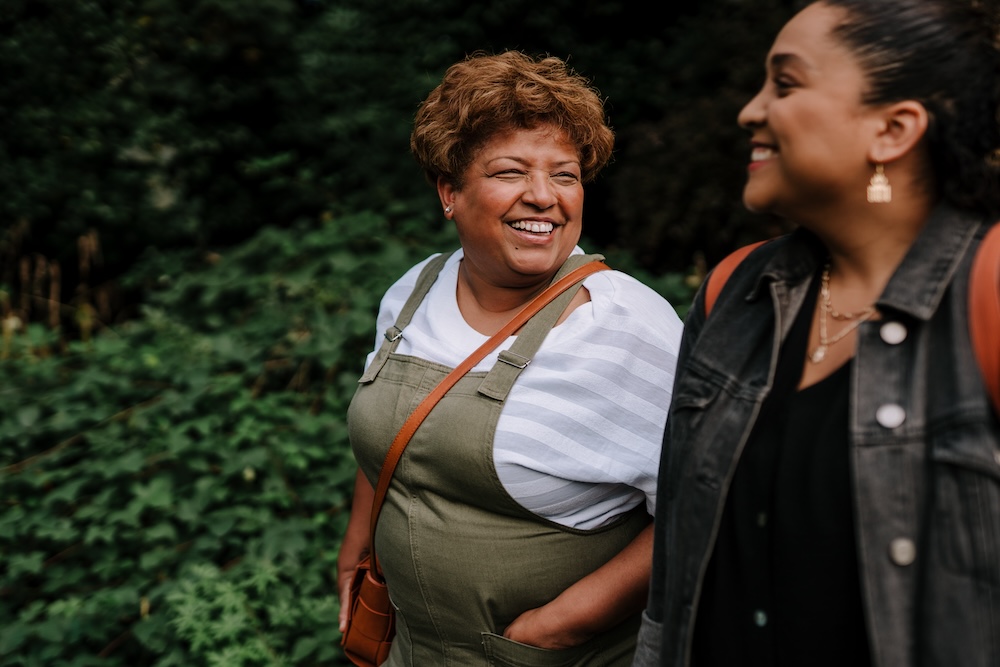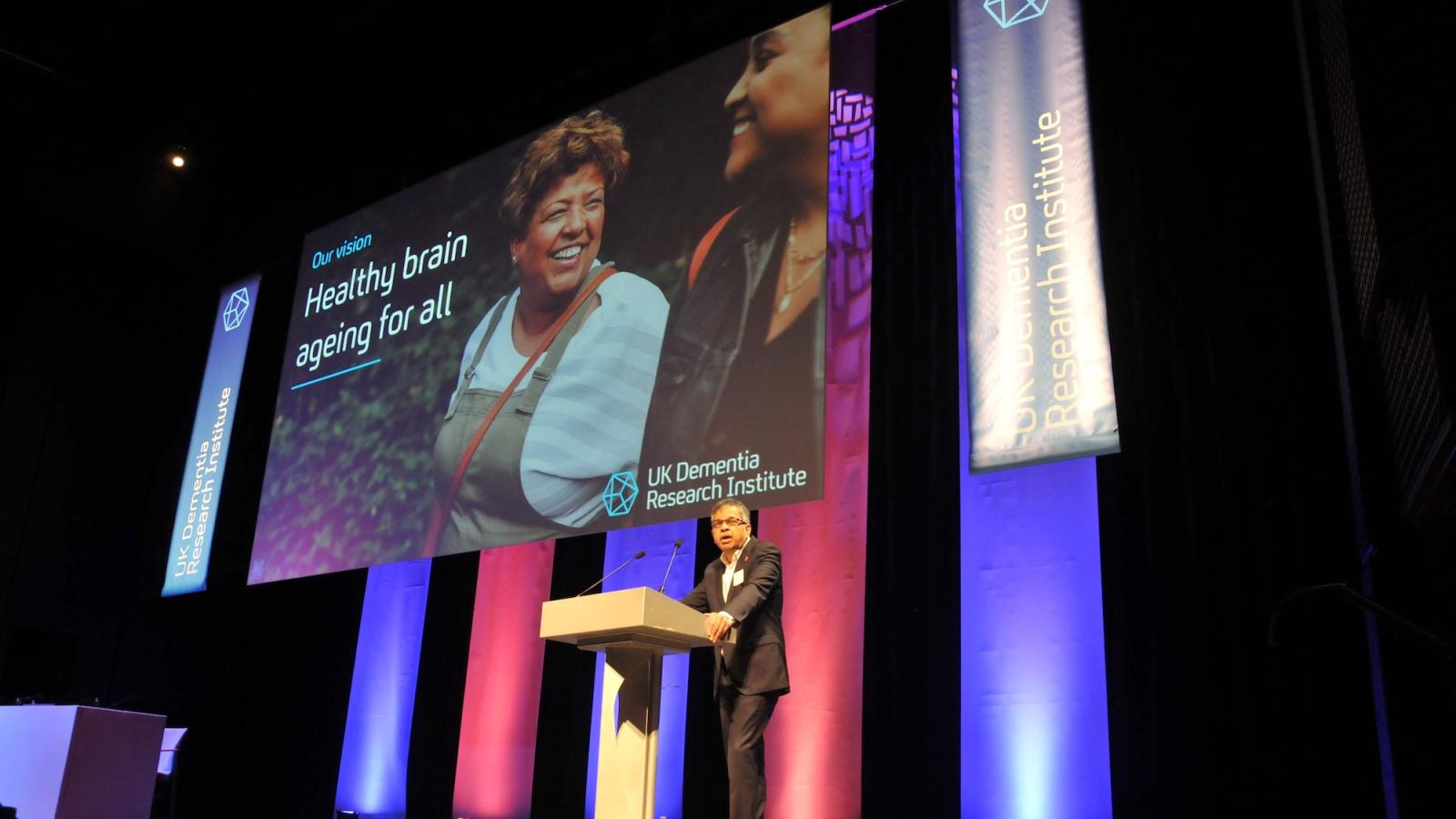As 2024 draws to a close, we reflect on a transformative year for the UK DRI. From groundbreaking scientific discoveries and impactful collaborations to the growth and strengthening of our talented research community, this year has marked significant progress toward our mission of transforming the lives of people affected by or at risk of neurodegenerative conditions. Join us as we celebrate the highlights of the past 12 months.
The next era for the UK DRI
This year, we were excited to launch our refreshed vision & mission, representing the next phase for the Institute. Our goal is to transform, through research, the lives of people affected by dementia and related neurodegenerative conditions. We will achieve this through discovering the causes of neurodegeneration, developing new tools and treatments, and delivering solutions to maintain brain health. Below, our Director Prof Siddharthan Chandran outlines his vision for a future of healthy brain ageing for all.
A turning point in the field as first drugs approved
Two new Alzheimer’s drugs lecanemab and donanemab were both approved by the UK regulator, the Medicines and Healthcare products Regulatory Agency (MHRA) in 2024, marking a major milestone in providing effective help for those living with the condition. However, draft guidance released simultaneously by NICE said the benefits of the drugs did not justify the costs under current guidelines, so neither will be available via the NHS. There is still a long way to go with these first generation of treatments, but Prof Chandran is optimistic, saying it “reinforces our commitment to advancing research that can truly benefit all patients.”
New discoveries and breakthroughs
Our scientists continued to make important breakthroughs, bringing us ever closer to our goal of transforming the lives of people affected by neurodegenerative conditions. This included a study challenging the dominant theory as to why we sleep, another promising new Alzheimer’s therapies that selectively remove aggregated tau, and the first results from the innovative platform trial, MND-SMART.
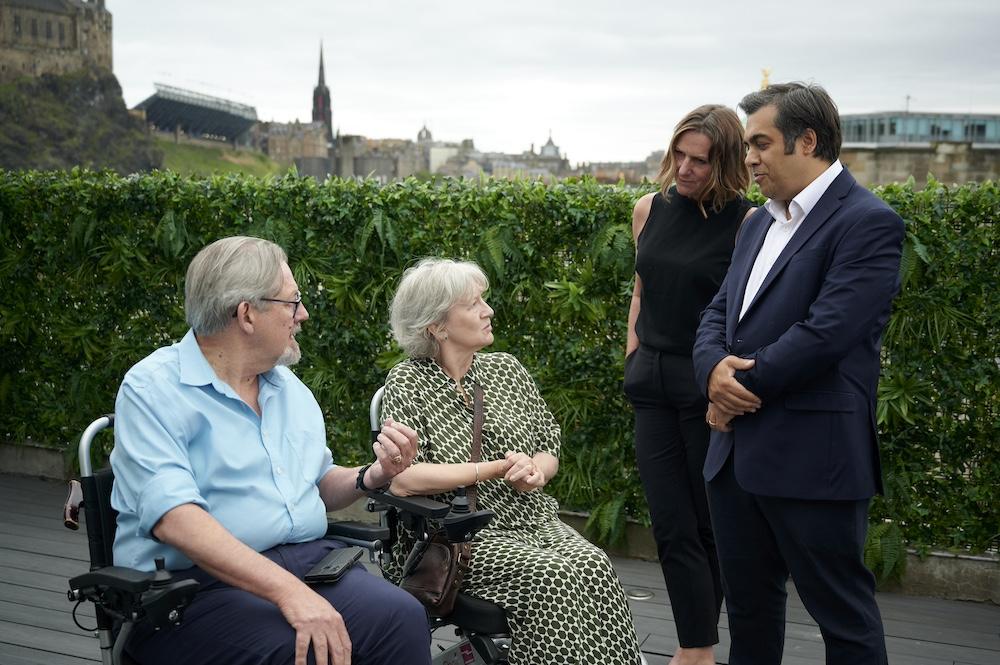
Trial participants and investigators at a recent MND-SMART meeting. Credit: Maverick Photo Agency
Grand Challenge project
Key Questions projects
We kicked off a major Grand Challenge project led by Prof Karen Duff, aiming to understand the earliest stages of Alzheimer’s, by uniquely studying molecular and cellular changes in mice, alongside behavioural changes in at-risk humans. We also launched a new funding scheme aiming to fund bold and boundary pushing research. Eight projects, ranging in subject from synapses to sleep, were awarded funding in the Key Questions funding programme.
In other news, UK DRI spinout AviadoBio reached a major milestone in the development of its gene therapy drug for frontotemporal dementia, entering into a licence agreement with Astellas Pharma Inc. to develop the drug.
Empowering the next generation of dementia researchers
Across the institute, we continued to champion and nurture the next generation of leaders in dementia research. We were delighted to welcome two new Group Leaders to the institute: Dr Philip Hasel joined the UK DRI at Edinburgh where he is investigating the role of astrocytes at the brain’s borders in neurodegeneration, and former Emerging Leader Dr Cynthia Sandor joined the UK DRI at Imperial, to continue her work developing digital biomarkers for Parkinson’s. In September, we announced three new Emerging Leaders: Dr Maura Malpetti, Dr Anna Mallach, and Dr Valeria Jaramillo – as they start their new labs and begin their independent research careers.
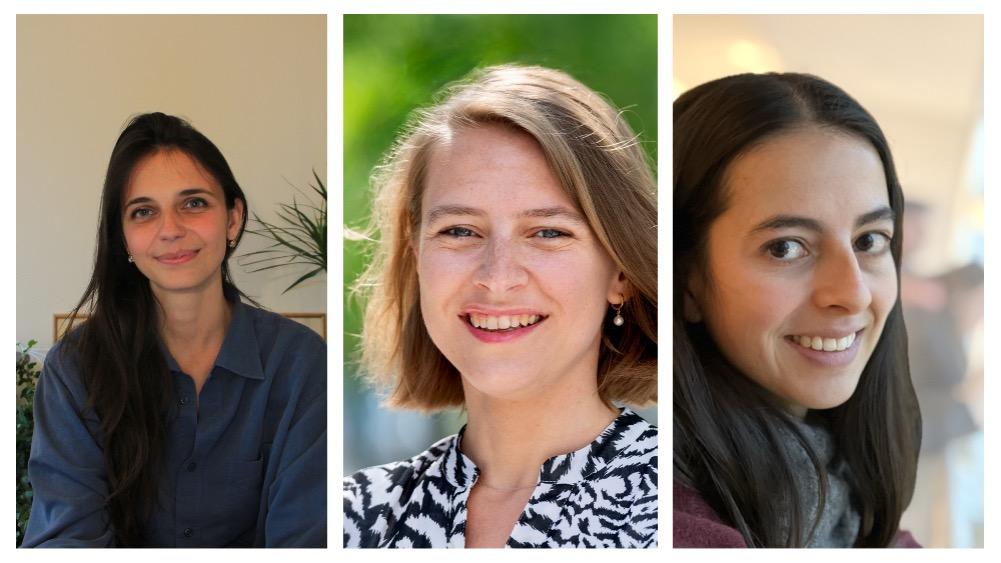
The three new Emerging Leaders: Maura Malpetti, Anna Mallach, and Valeria Jaramillo (left-right)
new Emerging Leaders
new Group Leaders
Convening scientific exchange in the UK and beyond
At a joint scientific meeting with Aligning Science Across Parkinson’s (ASAP), we brought together early career researchers (ECRs) to discuss their work, share ideas and form new collaborations. They also took part in a grant writing workshop led by Alzheimer's Research UK. And UK DRI ECRs travelled to Bonn, Germany, for the third annual CURE-ND meeting with our partners the German Centre for Neurodegenerative Diseases (DZNE), the Paris Brain Institute and Mission Lucidity. Over 110 participants from across the four institutions came together, in the joint effort to accelerate the advancement of neurodegenerative disease research in Europe. Later in the year, there was a CURE-ND symposium at the Alzheimer's Europe Conference in Geneva, where our Director Prof Chandran gave a talk.
Closer to home, we brought together scientists, technologists and staff from across our national institute for our annual conference, Connectome, in Harrogate in November. Highlights included fantastic ECR talks, over 200 scientific posters and excellent keynote talks from Prof Ulrich Hartl and Dr Michel Goedert. Our Chief Scientific Officer, Dr Jo Latimer, shared her thoughts in a blog post after the event.
Connectome attendees
posters
scientific talks
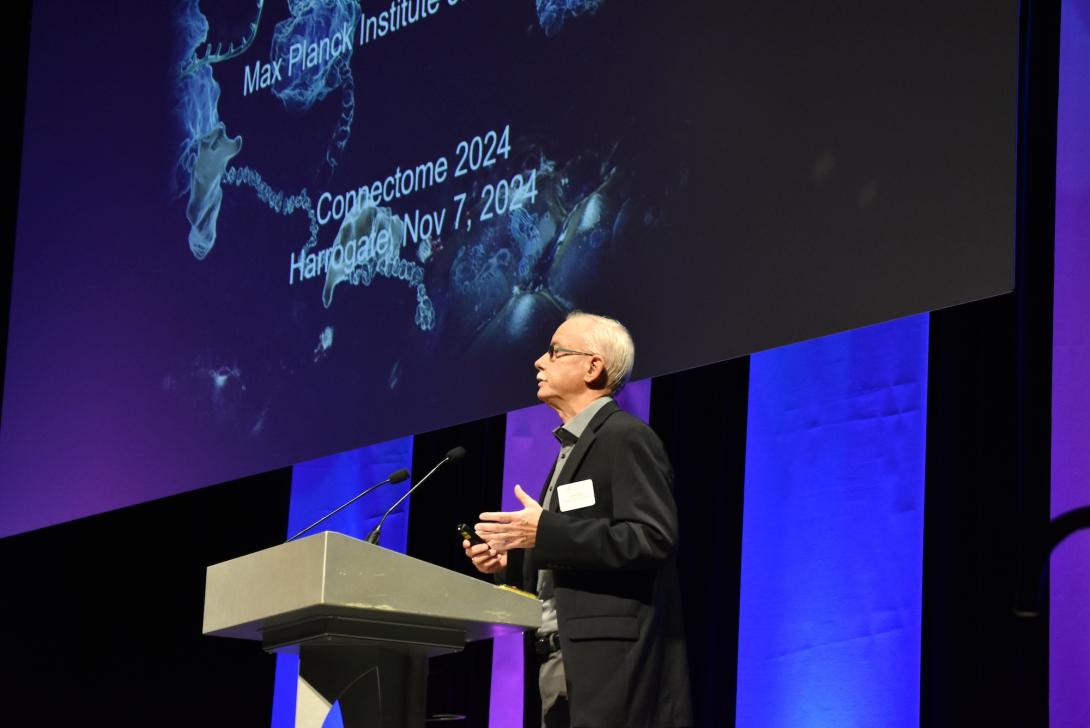
Prof Ulrich Hartl delivering his keynote speech at Connectome 2024
Partnering for success: BHF, Dementia Trials Accelerator and NIHR
After the establishment of our new BHF-UK DRI Centre for Vascular Dementia Research in partnership with the British Heart Foundation, we announced that Prof David Attwell had been appointed to lead the Centre. Recruitment for Group Leader positions is currently underway. Just recently, we were pleased to announce a major new partnership with the National Institute for Health and Care Research (NIHR), which committed an initial £20 million to accelerate the translation of new discoveries into impact for people living with dementia.
We also entered into an exciting partnership with Health Data Research UK to launch the government-backed Dementia Trials Accelerator, funded by the Medical Research Council. Supported by the government’s Dame Barbara Windsor Dementia Goals programme, the initiative aims to tackle the historically low number of people enrolled into dementia clinical trials in the UK.
We continued our work with the Epilepsy Research Institute, organising two focused roundtable events aiming to identify synergies between epilepsy and dementia. Researchers from both organisations took part in engaging and informative discussions to understand common features across the conditions.
We welcomed new staff to our Operational Leadership Team: Dr Jo Latimer joined as Chief Scientific Officer, Dr Roisin NicAmhlaoibh as Chief Innovation & Business Officer, and Juliet Morris as Chief People & Culture Officer. We also welcomed two new Board members: Dr Nathan Richardson (MRC) and Beth Scott (NIHR). This month, we were pleased to announce that Prof William Wisden will be the new Centre Director for the UK DRI at Imperial.
We bid a fond farewell to Prof Julie Williams as she stepped down from her role as Centre Director of the UK DRI at Cardiff. In the summer, we took a look back at some of Prof Williams’ fantastic achievements as founding Director of the centre.
Strengthening our work through lived experience expertise
Researchers across the UK DRI continued to engage meaningfully with the public this year – from fundraising and online outreach events, to science festivals like the Great Exhibition Road Festival. Sophie Horrocks (UK DRI Care Research & Technology), winner of the UK DRI Engagement Prize 2024, has been instrumental in implementing a strategy of patient and public involvement, connecting researchers and people with lived experience at our Centre for Care Research & Technology.
Elsewhere at Care Research & Technology, Dr Shlomi Haar organised a ‘speed networking’ event, bringing together people with lived experience of Parkinson’s, and early career researchers in the field. One participant said it was ‘heartening’ to learn that so many people are committed to research into Parkinson’s.
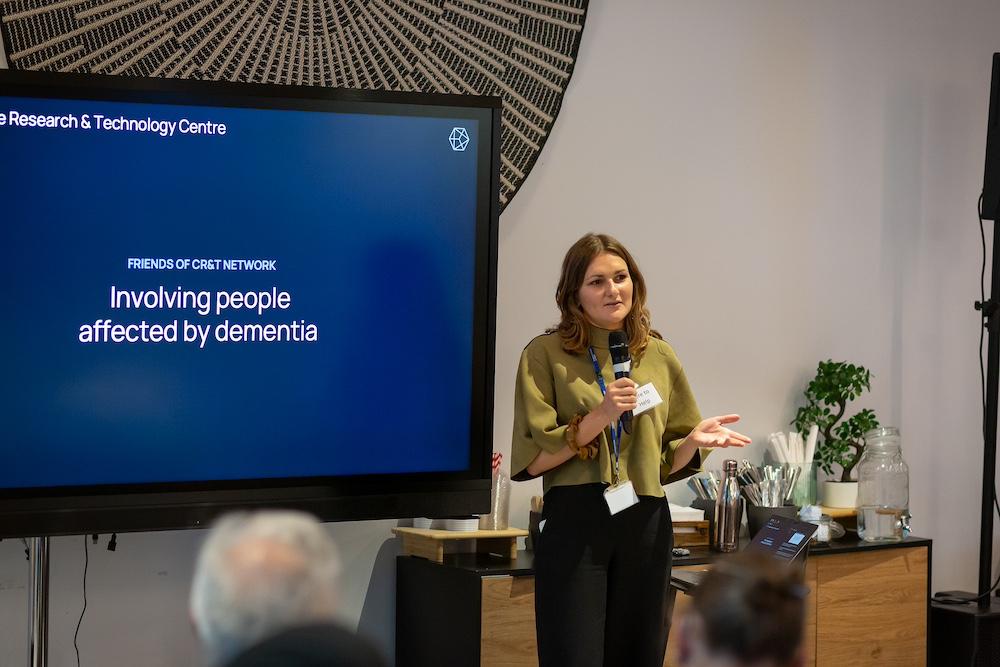
Sophie Horrocks at the Friends of CR&T launch event. Credit: Dan Weill Photography
Keeping dementia a priority
We organised several visits to the UK DRI for members of parliament this year, including Baroness Merron, the new Parliamentary Under-Secretary of State at the Department of Health and Social Care, who visited the UK DRI at UCL in July, and Jackie Baillie MSP, Deputy Leader of Scottish Labour and their spokesperson on health, who visited the UK DRI at Edinburgh in October. Two UK DRI researchers took part in the Royal Society Pairing Scheme this year, an opportunity for scientists to shadow an MP or civil servant and gain vital insight into how the worlds of science and policy intersect. Dr Kiran K G Ravindran and Dr Georgina Starling shared their experiences in blog posts.
In other influencing news, we worked with leading organisations, including our funders Alzheimer's Society and Alzheimer's Research UK, in the sector to produce a dementia manifesto, urging the incoming Government to take action on dementia. We also signed a letter led by the Campaign for Science and Engineering (CaSE) calling on the Government to protect funds for research and development in the autumn budget.
Georgina Starling (left) at the Royal Society Pairing Scheme Parliamentary Reception. Credit: The Royal Society
Fellows of the Royal Society
elected to the US National Academy of Medicine
Recognising excellence
Congratulations to all those who received awards this year, including all the recipients of our annual UK DRI Recognition Prizes. 2024 also saw Prof Sir David Klenerman awarded the Novo Nordisk Prize, 3 UK DRI researchers elected to the Royal Society Fellowship, Dr Veronique Miron elected to the Royal Society of Canada, Prof Tara Spires-Jones elected to Academy of Medical Sciences, Prof Julie Williams awarded the British Neuroscience Association award for outstanding contribution to neuroscience, Prof Sarah Tabrizi elected to the US National Academy of Medicine, and Lizzie English presented with a Diana Award for creating and leading Women in Neuroscience UK. A huge well done to all!
What’s next?
As we look ahead to 2025, the opportunities to accelerate progress in dementia research are immense. With new partnerships taking shape, bold research initiatives underway, and a continued commitment to collaboration, we are poised to build on the momentum of this year. Together with our dedicated researchers and partners, we will continue to push boundaries, innovate, and strive toward a future of healthy brain ageing for all.
Healthy brain ageing for all
Read more about the UK DRI's vision and mission
